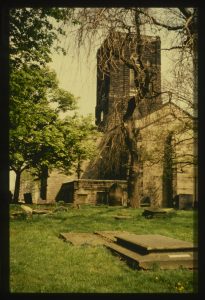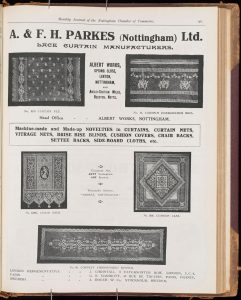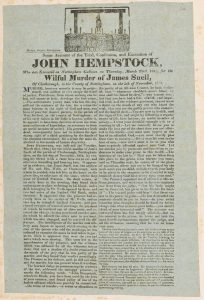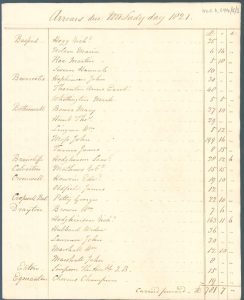June 15, 2020, by Kathryn Steenson
Family and Local History
A University library and archive is not the first port of call for many family historians. Manuscripts & Special Collections has more resources than some, and you don’t need to be staff or student at the University to come and use them. Normally we would have a stall at the Local History & Archaeology Festival where we could talk to you about your research, but as the Festival has moved online this year we’re hoping this brief guide might help.
Hatchings, Matchings & Dispatchings

Colour photograph of St Stephen’s Church, Sneinton, Nottinghamshire, 20th century. (Ref: GG 5/21/37)
The original Church of England parish registers will be in local record offices, although we have printed transcripts of parish registers from across the East Midlands, as well as Monumental Inscriptions produced by various East Midlands Family History Societies. We do have the original archives for some Nonconformist churches. This is the general term for Protestant churches which are not part of the Anglican church, and a few date back to the 17th century but the majority are from the 19th century. These include registers of baptisms, marriages and burials. Nonconformist baptism registers often give the date of birth of the child as well as the date of their baptism, and some burial registers noted the address of the deceased. However, some may be fairly brief, as it was up to the minister to fill in the register in the way they preferred. Some have been transcribed by volunteers, so you can carry on your research despite the lockdown.
Most couples were married after the calling of banns, read in the parish church on three consecutive weeks, but a significant minority of couples were married by licence granted from the Archdeaconry Court. Licences are ‘application forms’, requesting permission to marry. They are evidence of intent, not evidence that a marriage actually took place, but they often provide supplementary information to the brief entries in the parish registers; for example age, occupation, parentage of a minor (i.e. under 21). The marriage bonds can be searched by name in our catalogue.
Pre-NHS, the workhouse was one of the few places where the poor could receive any kind of basic medical care. Before it became Highbury Hospital, this included Basford Workhouse Infirmary, and we have an (incomplete) set of birth and death registers for patients there.

Advertisements for textile manufacturers, ‘Monthly Journal of the Nottingham Chamber of Commerce’, c.1918-1919 (Ref: MS 185)
Work, Rest and Pray
One of the most common enquiries we receive is that from people wishing to trace family members who worked on the landed estates or local businesses, often textiles factories. Sadly things like staff lists and wages books have a very patchy survival, with some collections having no staff information at all. The chances of finding staff information are higher if your ancestor was a long-standing or high-ranking employee (or was involved in an accident at work), because although you may find tradesmen’s bills or servants listed in account books, these often simply list positions and not names.
Before 1870, Sunday Schools were the only formal education available to the poor. Sunday School records may include admission registers, giving the names, addresses and ages of children enrolled in the Sunday School. Sunday Schools also arranged outings and day trips, and for the adults in the congregation there were church clubs and, especially for Nonconformist churches, societies for social reform.
Home Sweet Home
Leases and other deeds are common documents in any estate collection, and we have tens of thousands of them: Dukes of Newcastle Collection alone has 24,500. Being legal documents they will always have standard information included. At very least you’ll find a name, occupation and place of residence and sometimes next of kin (usually a spouse). It might also have additional details of family members, for example if a property is leased to someone for their life, and then tenancy is transferred to their heirs.
The major source of family history information in estate collections though are the maps, surveys and rentals. Maps were time-consuming and expensive to create. A good survey may have been used for two or three decades before being replaced, and so any changes in land use, name or tenancy during that time were annotated on the documents. Each field or property had a correlating entry in a survey book, listing information like the occupiers’ name, a description of the land and its use, and its value. Similar details are recorded in the rentals, although these were compiled half-yearly. The records were intended for the landowner to keep track of how much money they were owed, with the details of their tenants’ lives a means to that end. Nonetheless it allows you to trace people’s working lives across the generations, as it was quite normal for tenancy to be inherited.

Broadside about the trial of John Hempstock for the murder of James Snell, 1815 (Ref: SC o/s 6001696272)
Crime and Punishment
We don’t have criminal court records (known as Quarter Sessions and Assize Courts until the 1970s) but we do hold the ecclesiastical court records for Nottinghamshire. Its remit was moral offences and most of its business was taken up with cases of drunkenness, fornication, illegitimacy and even the odd sorcerer or two. Often what survives is a presentment bill summoning people to the court and, if they were found guilty, penance documents proving that they had carried out their punishment (or, alternatively, an excommunication if they didn’t comply). There will be a video about the church court as part of the Festival, so keep an eye out if you’re interested.
The church court also licenced Sunday School teachers and midwives, although their primary concern was to establish the good moral character of the candidate (not their competence!). The records are searchable in our catalogue – and during lockdown we’ve been able to add hundreds more names to the index!
More information about the archives and rare books we hold in Manuscripts & Special Collections is on our website, as well as guides on how to use and read old documents. You can also read our newsletter Discover and follow us on Twitter @mssUniNott. Currently the Reading Room is closed due to Coronavirus, but if you have a question or want copies of the documents shown here, get in touch at mss-library@nottingham.ac.uk and we’ll do our best to help.
No comments yet, fill out a comment to be the first


Leave a Reply